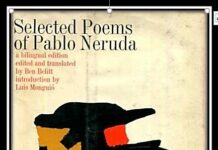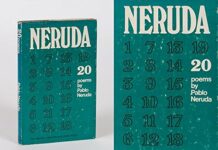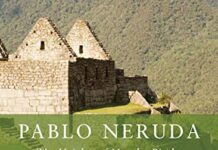
Ebook Info
- Published: 2004
- Number of pages: 352 pages
- Format: EPUB
- File Size: 0.45 MB
- Authors: Pablo Neruda
Description
New Directions celebrates the Pablo Neruda Centennial.In celebration of the 100th anniversary of Pablo Neruda’s birth, New Directions is pleased to announce the reissue of a classic work in a timeless translation by Donald D. Walsh and fully bilingual. Residence on Earth is perhaps Neruda’s greatest work. Upon its publication in 1973, this bilingual publication instantly became “a revolution… a classic by which masterpieces are judged” (Review). “In Residence on Earth,” wrote Amado Alonso, “the tornado of fury will no longer pass without lingering, because it will be identified with [Neruda’s] heart.”
User’s Reviews
Reviews from Amazon users which were colected at the time this book was published on the website:
⭐This is one of the best books in poetry I’ve ever read. It was a classic since the very moment of its publication in 1933. Perhaps you should know I’m an autodidact reader –as the majority I guess– and for ten years or more I read hundreds of poetry books, in a closed line that goes from the classics until the present time. My native language is Spanish so is easier to me to read poetry in Spanish. Everybody knows that in being translated poetry loses some elements like the sound, the rhythm and the rhyme. So all we are born in a poetic community and are –in a special sense– condemned to dwell in it. Translators make good jobs but there is something that cannot be translated. Some says that that something is exactly the poetry.Having said that, I’m going to talk about Neruda and this wonderful book. It was written when Neruda was in his late twenties, in different locations and inspired by different situations, people, languages and… women. Residence on Earth is a book in which nothing happens. Everything is happening without advancing to any place or any site. That’s why Neruda uses the gerund all the time. There is no narrative in the usual sense. So at a first glance the reader (I was twenty six when I read it for the first time) feels very confused. “What’s this” is the recurrent question. After reading poetry in the line of the so called Golden Century in the Spanish tradition and since then all the way up to the eighteenth or nineteenth century, you discover that this book is out of place. And then you try to answer the question “What is Neruda doing?”There is no narration, yes, so the language is the main character here. It doesn’t matter who or where this poems were inspired. What matters is the unexpected discovery of a new way of expressing what happen when nothing happens. It doesn’t matter the history of the book, it doesn’t matter Neruda, what matters, once again, is the triumph of the language as an entity that gives meaning to every single life. The words act as a wave that makes vibrate your thoughts. You can imagine everything but can you imagine the imagination in itself?Some people, after reading Residence on Earth have told me that they don’t understand anything at all. The answer is that there is nothing there to be understood. You just have to read and see what happens. And they say, nothing happens. So, pal, you cannot read poetry. You need some best seller or a self help book or ride a bicycle, not this.Neruda wrote in a selected bunch of poems something like a totality. Consider this: What would happen to you if suddenly you were encircled by a reality that you cannot understand? You don’t understand languages, mores, manners, clothes, nothing. Then, at that very moment, maybe you could write your own Residence. This is what Neruda did.After this book, Neruda begins a long descent to the materials of an ordinary life, encompassing from artifacts and plants or seashells to history and politics. This is a long descent of a poet who was a prodigy. He could build poems out of the blue. That was the genius. His genius. But then entered life with all its stuff and all its noise. Neruda lost the brilliance and the touch of a poetry with no links. He kept the genius but he lost the height he used to dwell in and resided as a fallen god among us.Few poets of the twentieth century will compare. Among others I should mention César Vallejo, Federico García Lorca, Luis Cernuda. There are more, but no much more with a unique and exquisite book like this.I hope you’ll enjoy as I did. The recipe consists in reading a little each time. One day you read one or two poems, then you read one more and so on. I’ve got, I don’t know, many many editions of the book. I always keep one very close to me. Perhaps you may end up like me. Make an attempt at least.Then you can tell me.(Note: I took the title of my review from the Chilean critic Ignacio Valente.)
⭐A beautifully written poetic work which is translated into English and contains the original Spanish version on the opposite pages. We miss you Pablo and hope your journey to find the best in life continued to the afterlife.
⭐I can’t count how many times I have given this book to beloved friends. His writing hits a part of your brain you do not usually access. I find myself purchasing a book of poetry and asking, “this is cool, but do you have any Neruda?”
⭐Neruda’s universe is boundless.I am sorry my Spanish skills make reading his poems in the original so difficult.
⭐by one of the greatest poets of our agesublime in its magnificent use of language and its fearlessnessan inspiration
⭐I am sure this will be a distinctly minority view, but I would caution the first time, non Spanish speaking reader of Neruda away from this work and this translation.I find the poems from the first residence here almost impenetrably surrealistic and the translations overly literal in many places. The later poems are awkwardly political, violent, and at times vulgar. There are bright spots such as the Ode to Federico Garcia Lorca, but to my taste, they are few and far between.I would, instead of this volume, recommend Stephen Mitchell’s lovely translations of the later works of Neruda entitled “Full Woman, Fleshly Apple, Hot Moon”.Those of you who are already spitting mad that anyone would dare to find Neruda anything but brilliant need read no further, but for those wondering how I can complain about translations that everyone else praised, I will take some time with one poem to flesh out my position.The very first poem in the collection is Galope Muerto or Dead Gallop as Mr. Walsh renders it. There’s just not space to render both Spanish and English, but I’ve spent hours with both due to things like the translation of the very first line including the phrase “like seas peopling themselves”. Now I don’t care if you are a surrealist or something else, that phrase is English drivel. Two lines later we find “the crossed bells crossing,” which while not exactly nonsense, does not move the meaning of the poem forward in any accessible way.Later in the second stanza of the same poem we have “… like the pulley wild within itself,/ those motor wheels in short.” Now, this make no earthly sense in English. It also ignores the punctuation of the second line in Spanish that reads ” esas ruedas de los motores, en fin.” I wouldn’t mind that if it improved the sense of what was said, but here something seems lost without recompense. Worse yet, the translation continues: “Existing like the dry stitches in the tree’s seams,/ silent, all around, in such a way,/ all the limbs mixing their tails.” Again, I’m sorry, with due respect to Mr. Walsh, this is jibberish. And while he’s preserved the parenthetical phrase here by rendering “de tal modo” as “in such a way” it relates to no phrase before it nor any following and so is parenthetical to nothing. It justs sits there without meaning.Since these lines were some of the first I read and bothered me so, I spent in excess of twenty hours with on-line translators and a Spanish/English dictionary to try to decide for myself what some reasonable sense of these two stanzas might be in English. Admittedly, the Spanish is either quite figurative or idiomatic. Some of what I complain of above is pretty literally what’s written. Still, when a translator is willing to render gibberish rather than trying to provide lines with reasonable meaning, I’m just never going to be able to trust what I’m reading. Certainly, you can go too far in the other direction as well, but really, tree limbs mixing their tails? Sorry, Mr. Walsh lost me and any recommendation I might have given this volume in these first two stanzas.It’s just not that hard to see that colas, the word he translates as “tails” also can mean a train, like on a dress, and that dry stitches in the seams of a tree might “combine” (another meaning for the word he translates as mixing) the limbs of the trees into such a thing. Thus, perhaps: “Existing like the sapless stitches in the seams of trees,/ silent, surrounding, so that/ all the limbs combine in a train.”/.The pulley (I think) is “mad within itself, those wheels of its motors, anyway.” And “the crossed bells crossing” at the “crest of the roads”, might be rendered: “the criss-crossed overlapping sound of bells”. Admittedly, “seas peopling themselves,/ in the submerged slowness, in the shaplessness,” was a puzzler. I settled on “…seas becoming occupied/ by submerged slowness, by formlessness,”. If this is Greg Nobody saying what he thinks the Nobel Prize winning poet said, sure it is, and maybe it’s off base, but at least for me, a questionable or even wrong meaning was preferable to none.Neruda was a great poet. As a starter though, I’d send the non Spanish speaker someplace other than this volume, despite, I’m sure, that recommendation will be a minority view.
⭐I belong to a poetry group which meets monthly and recently one of our members suggested to explore Pablo Neruda. I had never heard of him and quickly purchased Residence on Earth. His poetry is amazing and I feel ashamed not to have heard of him. If you enjoy poetry, then do try him. The poetry in Residence on Earth was written in 1933 and his melancholy and loneliness shines through. Neruda is heralded as Chile’s greatest poet and won the Nobel Prize for literature in 1971.The left hand side of the page is in Spanish whilst the right in English – translated by Donald Walsh. Try and find someone to read the poem in Spanish to get the rhythm whilst you read the translation.Neruda is indeed a master of his craft.
⭐Excellent Neruda. Takes you into the actual world of Pablo Neruda and his truly romantic poetry.
Keywords
Free Download Residence on Earth (New Directions Paperbook Book 992) in EPUB format
Residence on Earth (New Directions Paperbook Book 992) EPUB Free Download
Download Residence on Earth (New Directions Paperbook Book 992) 2004 EPUB Free
Residence on Earth (New Directions Paperbook Book 992) 2004 EPUB Free Download
Download Residence on Earth (New Directions Paperbook Book 992) EPUB
Free Download Ebook Residence on Earth (New Directions Paperbook Book 992)





